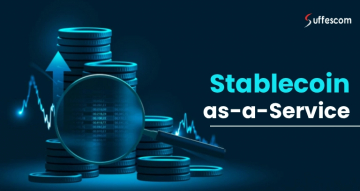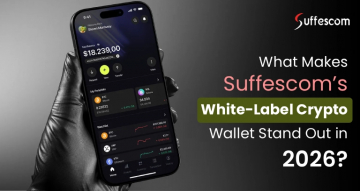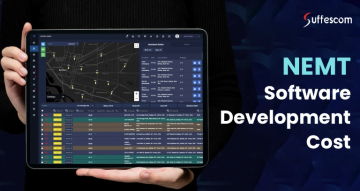Real Estate Tokenization Platform Development Cost in 2026

Understanding the real estate tokenization platform development cost in 2026 has become critical for businesses entering the digital asset space. With global tokenized real estate projected to exceed $16 trillion by 2030, developers, investors, and fintech entrepreneurs are racing to build platforms that enable fractional property ownership.
However, before building a platform, understanding the actual development cost is essential.
This comprehensive guide provides a clear and practical breakdown of what it takes to build a real estate tokenization platform in today's market. Whether you're a property developer, a fintech founder, or an investor exploring new digital asset models, this guide will help you understand where your investment goes and what to expect at every stage.
We'll cover everything from core features and technology stack to regulatory compliance, ongoing maintenance, and hidden costs. No confusing jargon just practical insights tailored to your needs. Let's dive into the real numbers behind building a successful tokenization platform in 2026.
Understanding a Real Estate Tokenization Platform
A real estate tokenization platform converts property assets into digital tokens on a blockchain. These tokens represent fractional ownership and enable seamless trading among investors worldwide.
As demand for digital real estate investment grows, understanding the property tokenization app cost becomes crucial for those planning to build an RWA (Real-World Asset) tokenization platform. A typical platform includes modules for asset listing, investor onboarding, KYC/AML compliance, smart contract management, wallet integration, and secondary market trading. The real estate tokenization cost varies significantly based on which components you prioritize.
The platform ensures regulatory alignment and secure transactions. Different models exist, including equity-based tokenization, debt-based tokenization, and hybrid structures that combine both approaches.
While the technology stack and feature set vary, core components such as investor dashboards, admin panels, token issuance engines, and investor portals are standard. The benefits include faster liquidity access, lower capital entry barriers, and global investor reach. Applications range from single-property fractional ownership to large-scale REIT (Real Estate Investment Trust) tokenization.
The cost to build a blockchain real estate platform depends heavily on these components, so having a clear understanding of platform functionality helps establish accurate budget expectations.
Reduce Your Real Estate Tokenization Cost
Minimize development expenses with the right strategy and smart planning.
Key Factors Affecting Real Estate Tokenization Platform Cost
The real estate tokenization platform cost depends on several critical factors. Understanding these will help you budget strategically and plan more effectively.
1. Platform Complexity: More features translate to increased development time and cost. A basic MVP (Minimum Viable Product) is more affordable, while a full-featured platform with custom dashboards, automated compliance tools, and advanced analytics will significantly increase costs.
2. Blockchain Selection: Different blockchain networks have varying development frameworks, transaction costs, and scalability characteristics. Your choice affects both upfront development costs and long-term operational expenses.
3. UI/UX Design: Superior design requires more time and budget allocation. Simple user interfaces cost less, while custom-designed experiences with interactive elements and responsive layouts increase development costs.
4. Third-Party Integrations: KYC/AML verification, payment gateways, wallet services, and analytics tools often come from external providers, which add to overall costs.
Common integrations include:
- Identity Verification: Onfido, Jumio, Sumsub ($2,000-$4,000)
- Payment Processing: Stripe, PayPal, cryptocurrency processors ($1,500-$3,000)
- Wallet Services: MetaMask, WalletConnect, Coinbase Wallet ($1,000-$2,500)
- Analytics & Reporting: Custom dashboards and data visualization ($3,000-$8,000)
5. Security & Smart Contract Auditing: Data encryption, multi-factor authentication, and comprehensive smart contract audits ensure platform safety and meet institutional security standards, but these measures require higher budget allocation.
6. Compliance and Legal Setup: Compliance tools for jurisdiction verification, investor accreditation checks, securities law adherence, and tax reporting are essential. These features ensure your platform meets legal standards but increase development costs.
7. Development Team Location: Hiring developers from different geographic regions significantly affects your total budget due to varying labor costs and expertise availability.
8. Project Timeline: Aggressive launch schedules may require larger development teams or overtime work, which increases overall costs.
9. Maintenance and Support: Post-launch maintenance includes software updates, bug fixes, security patches, and feature enhancements. Support plans typically come with monthly or annual retainer fees.
10. Customization Level: Higher degrees of customization lead to increased real estate tokenization platform costs, as bespoke features require more development hours and specialized expertise.
Real Estate Tokenization Platform Price: Cost Breakdown
Understanding the real estate tokenization platform price requires examining costs across different project scales. Here's a detailed breakdown:
| Project Scale | Development Cost | Key Features Included |
| MVP/Basic Platform | $15,000 - $25,000 | Basic token issuance, investor dashboard, KYC integration, single blockchain support, wallet connection |
| Mid-Tier Platform | $25,000 - $30,000 | Multi-asset support, secondary marketplace, advanced compliance modules, 2-3 blockchain networks, automated distributions |
| Enterprise Platform | $30,000 - $50,000 | White-label solution, comprehensive API access, custom smart contracts, multi-jurisdiction compliance, dedicated technical support, institutional-grade features |
The number of features, deliverables, and components differs according to project scale. A fundamental tokenization project includes basic features, tools, and functionalities perfect for early-stage startups or pilot projects.
Let's examine the different elements related to project complexity that contribute to the cost of developing a real estate tokenization platform:
1. Custom-Built vs. White-Label: A white-label tokenization platform is faster and more affordable but offers limited customization options. Custom-built platforms provide greater flexibility and unique branding but require more time and development effort, which increases the real estate blockchain platform cost.
2. Security and Compliance Layers: If your platform needs robust regulatory compliance or serves international investors, you'll require more advanced legal and security modules. This increases complexity and overall development cost.
3. Smart Contract Design: Simple ERC-20 tokens for fractional ownership are straightforward to implement. However, if you require sophisticated functionality such as automated dividend distributions, rental income allocation, or complex governance mechanisms, you'll need more advanced smart contracts. These require deeper blockchain expertise, raising development costs.
4. Third-Party Integrations: Integrating tools such as legal document management systems, digital identity verification APIs, escrow services, payment gateways, and analytics platforms makes the platform more powerful and user-friendly. Each integration increases both complexity and cost.
To optimize your platform within budget constraints, determine your platform's scale, decide between custom development and white-label solutions, evaluate required security and compliance layers, plan smart contract functionality, and identify essential third-party integrations.
Blockchain Network Selection & Development Costs
Choosing the right blockchain directly impacts the real estate blockchain platform cost. Some blockchains are more affordable and easier to build on, while others offer better scalability but require larger budgets.
Here are several blockchain networks to choose from:
1. Ethereum
Widely adopted for enterprise tokenization but historically expensive due to high gas fees (though Layer 2 solutions have mitigated this). Ideal for robust, enterprise-level platforms requiring maximum security and established ecosystem support.
2. Polygon
Offers significantly lower fees and faster transaction processing. Ideal for startups seeking Ethereum compatibility and scalability without prohibitive costs.
3. Binance Smart Chain (BSC)
A balanced choice offering affordability, transaction speed, and developer-friendly tools. Strong ecosystem support with moderate gas fees.
4. Avalanche and Tezos
Excellent for flexible smart contract logic and energy-efficient consensus mechanisms, but may require developers with specialized expertise, which can increase costs.
5. Hyperledger Fabric
Designed for enterprise permissioned networks, offering privacy, scalability, and customizable governance. Best suited for institutional real estate platforms with specific compliance requirements.
Before selecting a blockchain network, ensure your development team has relevant experience. Familiarity accelerates development and reduces the cost of a tokenized real estate platform. Working with a new or complex blockchain requires additional time for research, testing, debugging, and security auditing.
How Does the Development Process Impact Real Estate Tokenization Cost?
The development process plays a significant role in determining the budget for real estate tokenization platform development. The steps you take and decisions you make can substantially influence final costs.
Here's how the process typically unfolds and how it affects your budget:
1. Consultation and Requirement Analysis
This is where you define your objectives and feature requirements. The more precise your goals, the smoother subsequent phases become. Coming prepared with a detailed feature list saves time and money on revisions.
- Prepare a clear list of features before your first meeting.
- Define your goals and use cases in detail.
- Ask for a rough estimate early to align expectations.
2. Choosing the Right Development Partner
Experienced blockchain developers may charge premium rates, but they build faster with fewer errors. Less experienced teams might appear cheaper initially but could cost more long-term due to rework and delays.
Here’s how to choose the right real estate tokenization development company:
- Look for teams with proven experience in tokenization.
- Check past work to avoid trial-and-error delays.
- Choose partners offering fixed-price models or MVP packages.
3. Feature Prioritization
Not every feature is essential for initial launch. Distinguish between must-have and nice-to-have features. Starting with an MVP keeps your cost of a tokenized real estate platform closer to $15,000–$25,000. A feature-rich platform could push costs toward $50,000 or higher.
- Focus on core features for the initial release.
- Avoid building rarely used features in version one.
- Use customer feedback to decide what to add later.
4. UI/UX Design
A clean, intuitive design improves user adoption and engagement. Pre-built templates are more affordable but offer less differentiation.
- Utilize pre-built design templates where appropriate
- Limit custom visuals unless they provide tangible value
- Maintain clean, simple interfaces that prioritize usability
5. Smart Contract Development
Smart contracts are the backbone of your platform. Basic token creation is straightforward, but custom logic for rental income distribution, dividend payments, or vesting periods increases complexity and cost.
- Start with standard token contracts (ERC-20, ERC-1400)
- Avoid overly complex automation in initial phases
- Plan advanced smart contract features for subsequent upgrades
6. Compliance and Legal Integrations
Do you need KYC/AML capabilities? Will your platform operate across multiple jurisdictions? Integrating legal compliance modules and identity verification tools can significantly increase development costs.
- Start with country-specific compliance
- Add multi-jurisdictional modules in later phases
- Use established third-party KYC/AML APIs rather than building proprietary tools
7. Testing and Quality Assurance
Every platform needs proper testing. The more features you include, the more time and effort are required for testing. Skipping this may reduce short-term costs but increase risks later. Ensure the best results with the following practices:
- Implement continuous testing throughout development
- Automate testing procedures where feasible
- Allocate dedicated budget for user acceptance testing before launch
8. Deployment and Post-Launch Support
Deployment involves launching the platform on your chosen blockchain and establishing hosting infrastructure. Some development partners include ongoing support and updates, which may increase initial tokenized property platform development costs but provides long-term stability.
- Select cloud platforms with scalable pricing tiers
- Prioritize essential support services at launch
- Negotiate monthly support retainers instead of hourly billing arrangements
Reduce Your Real Estate Blockchain Platform Cost Today!
Lower your property tokenization platform cost with expert guidance and efficient development strategies.
Monetization Models to Recover Real Estate Tokenization Platform Cost
A real estate tokenization platform is not merely a technology investment, it can become a powerful revenue-generating asset. When developed strategically, it can help recover initial development costs and grow into a profitable digital business.
Here are the most effective monetization models you can implement:
1. Token Listing Fees
Charge property owners or developers a fee to list their real estate assets as tokenized offerings on your platform. This model generates upfront revenue per listing and works effectively for platforms targeting multiple property developers.
Ideal for: Marketplaces or platforms focused on fractional ownership. Even modest monthly listings can significantly offset development costs.
2. Transaction/Trading Fees
Earn a percentage from every token trade or transaction executed on the platform. Requires integrated wallet functionality and secondary marketplace capabilities. Generates passive, recurring income as trading volume grows.
Ideal for: Platforms offering built-in DEX (Decentralized Exchange) or trading modules. Transaction fees become a strong revenue stream with minimal incremental tokenized real estate app development cost.
3. Asset Management Fees
Charge users for managing their tokenized assets, including portfolio tracking, performance updates, compliance reporting, and investor communications. Requires a dedicated dashboard for investor reporting and asset performance analytics.
Ideal for: Long-term real estate investment platforms. Provides stable, recurring income that helps recover development costs.
4. Subscription Plans
Offer tiered subscription packages for different user types—investors, property owners, and agencies providing access to premium features such as advanced analytics, custom token structures, and marketing support.
Ideal for: SaaS-based tokenization platforms serving both startups and established marketplaces. Helps recover tokenized real estate app development cost quickly through predictable monthly revenue.
5. White Label Licensing
License your platform's architecture to other companies under their brand. Provides high-margin B2B revenue stream with strong scalability potential for global expansion.
Ideal for: Blockchain development firms and tech entrepreneurs. A single white label deal can cover substantial portions of development budget.
6. Tokenization as a Service (TaaS)
Provide end-to-end tokenization services for real estate firms that don't want to build proprietary platforms. Deliver full-service backend including legal structuring, technical implementation, and compliance management.
Ideal for: Niche B2B segments, consulting firms, and blockchain agencies. Just a few annual projects can generate significant returns.
7. Advertisement & Promotion Slots
Offer promotional space on your platform for listed projects or industry partners. Enable businesses to advertise through sponsored listings, homepage banners, or featured property placements.
Ideal for: Marketplace-style platforms with substantial user traffic. Even limited ad placements can generate reliable supplementary income.
Final Thoughts!
Strategic planning before taking the first step toward developing a real estate tokenization platform consistently yields superior outcomes. Carefully analyze contributing factors, determine platform scale and blockchain network based on business requirements, and select appropriate development processes to establish realistic budgets.
To ensure significant returns on your real estate tokenization platform investment, choose suitable monetization models and recover the tokenized asset platform development cost efficiently.
Partnering with professional development services allows you to streamline these decisions. Suffescom Solutions can be an ideal choice for asset tokenization development. With over 13 years of experience and expertise in delivering blockchain solutions, Suffescom has established itself as a trusted partner for tokenization projects.
FAQs
1. How much does a real estate tokenization platform cost?
The cost of a tokenized real estate platform depends on the business requirements. The platform's cost differs with scale; an MVP platform costs between $15,000 and $25,000, a mid-tier project costs $25,000 - $30,000, and a corporate-level project costs between $30,000 and $50,000.
2. What are the factors affecting the property tokenization app cost?
Various factors affect the tokenized property platform development cost, such as platform complexity, blockchain network, UI/UX design, third-party integrations, security features, compliance and legal setup, development team location, project timeline, maintenance and support, and customizations.
3. How much is the real estate tokenization market worth?
As of 2026, the global real estate tokenization market is valued at approximately $2.5-3.5 billion and is growing rapidly. Industry projections suggest it could exceed $16 trillion by 2030 as adoption accelerates and regulatory frameworks mature.
4. What is the minimum amount you need to launch a real estate tokenization platform?
The minimum cost to build a basic tokenized real estate app starts at approximately $15,000 for an MVP with essential features.
5. What are the different monetization models for a property tokenization platform?
From token listing fees, transaction/trading fees, asset management fees, subscription plans, white label licensing, tokenization as a service (TaaS), and advertisement & promotion slots, many monetization models are available for property tokenization platforms.
6. How long does it take to develop a real estate tokenization platform?
Development timelines vary by complexity:
- Basic MVP: 8-12 weeks
- Mid-Tier Platform: 16-22 weeks
- Enterprise Platform: 24-36 weeks
- White-label solutions: 4-8 weeks
7. Do real estate tokenization costs include legal and compliance expenses?
No, most development quotes cover only technical development. Legal structuring, securities compliance, regulatory filings, and ongoing legal counsel typically require separate budgets and specialized legal expertise.
9. Can I build a real estate tokenization platform without coding knowledge?
Yes, through white-label platforms, no-code/low-code solutions, or by hiring experienced development agencies specializing in blockchain and tokenization platforms.







